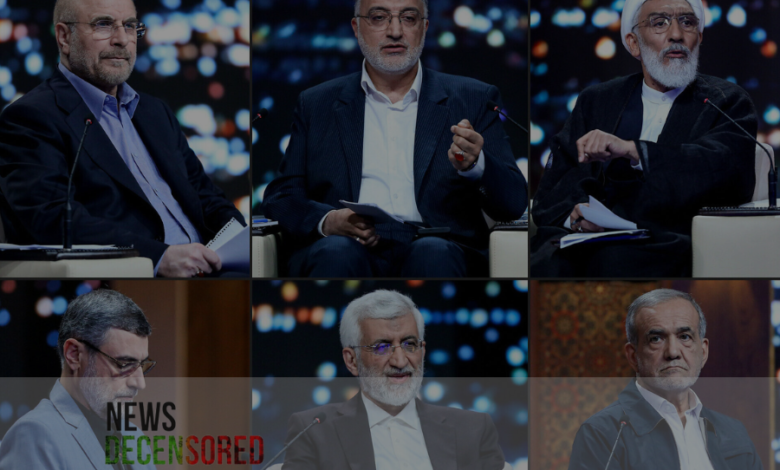Iran’s Presidential Hopefuls Debate Sanctions and Diplomatic Paths

Tehran: As Iran prepares for its early presidential polls on June 28, it struggles with the grim effects of the West’s economic ban. The six presidential candidates offer dissimilar solutions, which indicates the differences in their approach to the issue of Tehran’s relations with the West.
Americans’ return to the provocative approach after Washington’s exit from the 2015 nuclear deal has caused a series of years of stagnation and trial in all aspects of life, dissatisfaction with the Iranian political system, and people’s distress. This has been one of the most critical issues contestants seeking the second highest office in Iran have willingly or unwillingly addressed.
During the time of the late President Ebrahim Raisi, who unfortunately succumbed to a helicopter crash last month, the country experienced more significant pressure from sanctions from the Western world, mainly due to Iran’s nuclear program and its backing of militant groups and Russia concerning the invasion of Ukraine. These sanctions have pretty much crippled Iran’s oil export earnings, limited the flow of its exports and imports, and led to escalated inflation, the highest unemployment rate and the Iranian Rial at a historic low against the US dollar.
A shop owner selling carpets and rugs in one of Tehran’s largest markets, the Grand Bazaar, Hamid Habibi, 54, complained that the sanctions have badly affected people and should be lifted. We should start negotiating with America and European countries.
Fayyaz Zahed, a professor of international relations at the University of Tehran, asserted that the two programs, which focused on the economy, revealed that “almost all the candidates stressed that sanctions have had a disastrous impact on the country; it began that it is important to solve this problem to ease the suffering of the people. ”
The candidates, which include five conservatives and one reformist, are all focused on the economy as a significant issue to tackle; however, they all have different stances regarding the country’s relations with the West.
One of the favourites, pro-reform candidate Massoud Pezeshkian, advocates constructive relations with Washington and European capitals ‘to take Iran out of its isolation. ’
Pezeshkian, supported by the most critical reformist organisations and by Mohammad Javad Zarif, the former foreign minister and the man responsible for the 2015 nuclear deal, insisted that lifting the sanctions would enhance Iranians’ lives.
Because the US abandoned the nuclear deal in May 2018 without consent and approval from the Iranian side, Iran has gradually backed down from the agreement, which aimed at constraining some of its nuclear actions for peaceful ends. All diplomatic attempts to bring back the agreement to the mainstream have been put on hold due to tensions between Iran and the International Atomic Energy Agency.
Ex-President Hassan Rouhani, who headed the Iranian delegation during the preliminary negotiations for the JCPOA, said that sanctions affect Iran ‘over $100,000,000, directly or indirectly’ in terms of oil and petrochemical exports and cuts on Iran’s preferential trade rates with China, a party to the 2015 deal.
Ultraconservative candidate Saeed Jalili, a former nuclear negotiator, advocates hard-line anti-Western policies. “The international community does not consist of two or three Western countries,” Jalili said, calling for enhanced relations with China, Russia, and the Arab states, particularly Saudi Arabia.
Conservative candidate Mohammad Bagher Ghalibaf, the current parliament speaker, proposes a pragmatic approach: dealing with other Western nations only when it is in his interest in the economic boons. The author wants to upgrade the Iranian nuclear plans to pressure the West to begin talking more seriously.
Zahid, the professor of international relations, noted that Jalili, who used to be the head of the National Security Council, ‘’will be the most unyielding diplomatic candidate. Nevertheless, he pointed out that the country’s next president would not enjoy significant power in the decision-making process of strategic affairs, as the final say lies with the supreme leader, Ayatollah Ali Khamenei.
Saturday to the candidates of the parliamentary interviews, warning them not to utter their words liked by the enemy,” where the latter mainly means the Western, and particularly, the American countries. Zahid added that the president could only influence foreign policy if he ‘‘gained the confidence’’ of Khamenei and Iran’s premier establishment.




